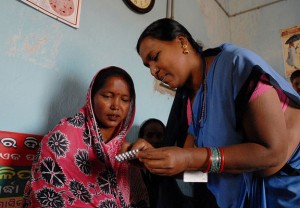Forward Movement on Women’s Rights
Feb 23rd, 2016 | By admin | Category: Reproductive Rights/Women's RightsBy Suzanne York, www.transition-earth.org.

[Photo Credit: Pippa Ranger/Department for International Development on Flickr, under Creative Commons (CC BY-NC-ND 2.0)]
Let’s first take a look at India – soon to be the world’s most populous country. For decades it has been relying on female sterilization as its primary form of contraception, but this is about to change. Despite its sad and controversial history of forced sterilizations in the 1970s, India has been slow to change course. The government still provides a cash incentive to women to undergo tubal ligations (approximately $20), and in 2014 thirteen women tragically died in Chhattisgarh due to botched operations at a government “sterilization camp.”
Smart Technology
Now, the government of Narendra Modi will, according to the New York Times, “take a major step toward modernizing that system, introducing injectable contraceptives free of charge in government facilities.”
Though sterilizations will continue, hopefully, with greater education and access to contraceptives, Indian women will understand that they have other choices.
Perhaps smart phone technology will help raise awareness and ease acceptance of modern contraceptives. Last month, a study by researchers at Johns Hopkins found that a new smartphone app developed to help married women in rural India better understand contraceptive choices led to a dramatic increase in the number of women using modern family planning methods in just a few months. By using videos that included educational and entertaining ways to increase awareness on family planning, the app was found to overcome some myths and misconceptions on family planning.
One Less Hurdle
Here in the U.S., California is set in April to join Oregon as the first states in the nation to allow women to get birth control pills and other hormonal contraceptives directly from their pharmacists – without a doctor’s prescription. Other states are looking into introducing similar legislation.
Even with the Affordable Care Act easing access to contraceptives, with most insurance plans providing birth control for free, many healthcare experts say the often time-consuming process of making an appointment and seeing a doctor to get contraception effectively limits access.
“The easier it is for someone to access medication, the more likely they are to use it,” said Sarah McBane, president of the California Pharmacists Association.
The California legislature could also vote on a bill that would give women consistent access to safe, reliable birth control by requiring all health care service plans and health insurance policies to cover a 12-month supply of prescribed, FDA-approved self-administered contraceptives, such as the ring, the patch and oral contraceptives. State senator Fran Pavely, sponsor of the bill, said “Women who are responsibly managing their reproductive health should not risk an unintended pregnancy simply because a prescription ran out.”
What much of this boils down to is providing women with more options when it comes to reproductive health and voluntary family planning. Women, and their partners, should have access to information on contraceptive services and products, as well as being able to easily speak with healthcare professionals, and then accessing contraceptives. In the 21srt century, women should have options, and their lives should not be put at risk by having to jump through hoops to plan their lives.
Suzanne York is Project Director of Transition Earth.

